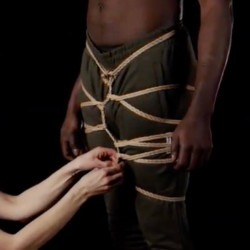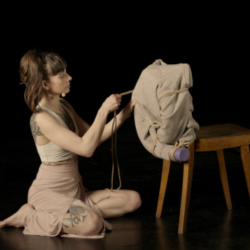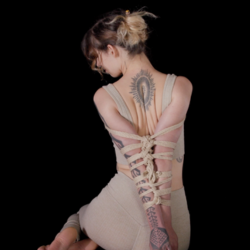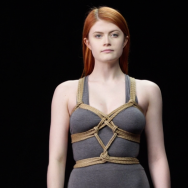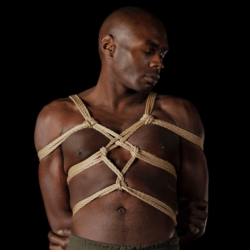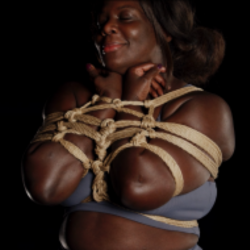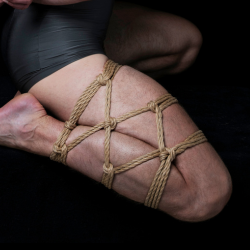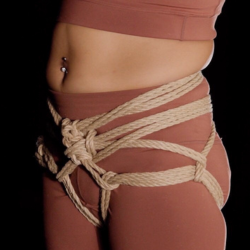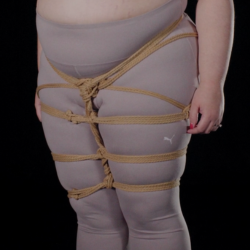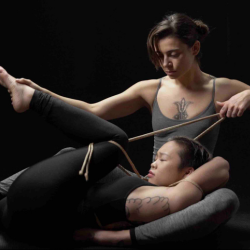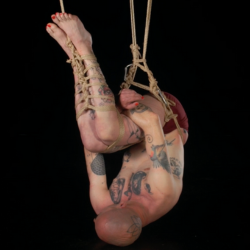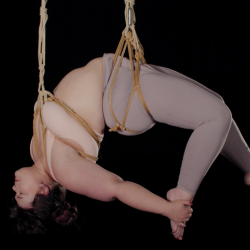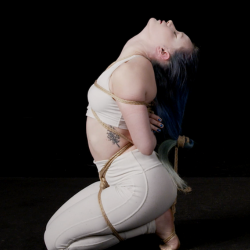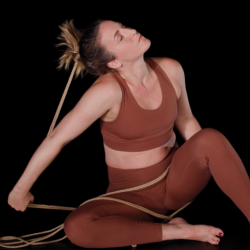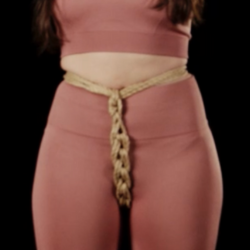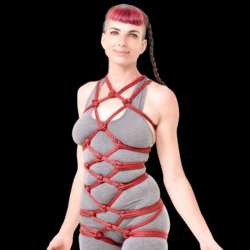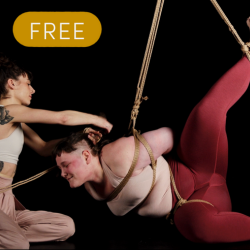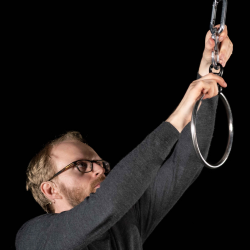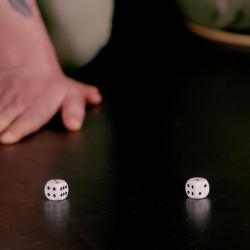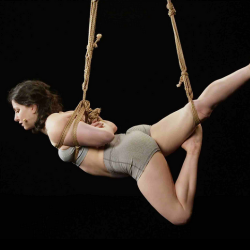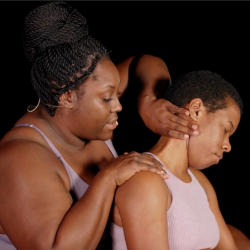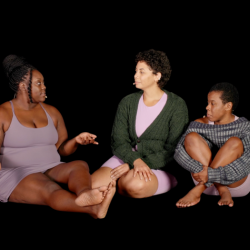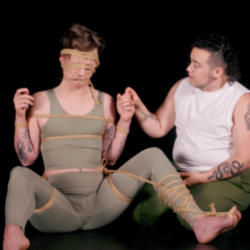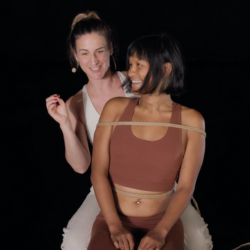EP 08
RIGGED THREADS
There’s micro-bondage and then there’s micro-bondage… Rigged Threads is an embroidery artist who translates all the complexity of Shibari into miniature!

Adrian, known as Rigged Threads, makes rope-inspired embroidery. Her art has been shown in galleries across the US.
Wicked Wren [00:00:18] Welcome to the Shibari Study podcast. I'm your host, Wicked Wren. Today I'm speaking with Adrian, the creator of Rigged Thread. Adrian makes stunning rope-inspired embroidery and her art has been shown in galleries across the US. Welcome to the show, Adrian.
Rigged Thread [00:00:35] Thanks for having me.
Wicked Wren [00:00:36] Is it true that when you're stitching hair you use tiny little rollers to curl the hair on the models?
Rigged Thread [00:00:46] Yeah. Yeah. On some of them. There's one that has red hair and I found plastic straws, which was right when plastic straws were also banned from the world. So I had to find these plastic straws and roll the hair and then put little bobby pins in it. And that was, that was fun. I felt very proud of myself for that one.
Wicked Wren [00:01:12] How did you come up with that?
Rigged Thread [00:01:14] So there's a few artists who are really, really good with embroidered hair and I messaged one of them and I was just like, How are you so good? And she was like, I can't tell you my tricks because I need to stay employed. And I was like, Valid. She's like, But really just look at hair and think about how hair works and you will get a lot better at doing hair. And I was like, Okay. And so I started paying more attention to how the color in hair works from like the nape to the neck to the front of the head. How the cut, like how your stylist cuts your hair, how it falls. And so one of the things I'm most proud of in my progression is like when I look at my original stuff, the hair kind of looks like a broom in my mind. And then it gets progressively more hair-like. So the rollers were just like, okay, well, how do you make any hair curly? You put it in rollers, so let's try it.
Wicked Wren [00:02:24] The hair that you have is dead on. And also the rope is too. I've heard that you used small tweezers in order to get the different knots and frictions and things.
Rigged Thread [00:02:34] Yeah. And there are sometimes where I like learned how to do the knot before I made the piece. But ultimately, you know, you can't recreate a 3D tension on a 2D body that's also fabric. It just isn't going to work exactly. I try to mimic it as close as possible. That's also part of the reason why I don't know many of the names because I just like looking very intensely at them. And so some of the frictions are the exact frictions, and then I'll pin them down and sell them. Other times I kind of cheat and just make them look like the knot they're supposed to look like.
Wicked Wren [00:03:21] And you learned how to embroider from your grandmother, right? What were some of the first things that you stitch with her?
Rigged Thread [00:03:27] I actually still have this little button creature that we made where we took buttons and stacks of it. It looks kind of like a little person, a little voodoo doll of buttons. And that was one of the first things that we made together. I don't have any of the things that she and I made together, but I distinctly remember the smell of the basement where I learned how to stitch. And she taught me how to tie the knot. And I'm, I wish I could show you, but you essentially lick your two fingers, roll your thread around your finger and like, roll your pointer finger against your thumb. And she would have me do that on repeat until I could get the knot done really, really quickly.
Wicked Wren [00:04:18] When your mom saw your art, she said that she was concerned.
Rigged Thread [00:04:23] Oh, yeah. Yeah. There was a lot of crying. My mom and I are close now. We've had tricky as most parents and children do.
Wicked Wren [00:04:39] Definitely.
Rigged Thread [00:04:39] Yeah. But she is very emotional and very willing to tell me how she's feeling and also very willing to listen to me. So I feel really lucky. Like, I kind of knew I was like, okay, I'm going to tell my family I'm doing this because I am literally so proud of myself. My mom, you know, cried a lot and essentially started telling me about a friend of hers who had entered a S/M relationship. And that relationship didn't go very well. And so my mom and I sort of hashed all of this out. And it came down to she, like many people, conflate S/M relationships with abuse. And so we sort of talked about, quote on quote, normal relationship can also be abusive and how I feel like I'm pretty, a pretty solid person. And also just we established I will never talk to my mom about (…). By me telling you about my embroidery, of my successes and my pride and something beautiful that I'm making, I am not necessarily telling you about my (…) life.
Wicked Wren [00:06:01] It sounds like your embroidery was a catalyst for growth between your mother and you.
Rigged Thread [00:06:06] Yeah, it was. Honestly like there is this point in time where I didn't understand, like internet anonymity, how to, like, stay safe on the internet, essentially. So I had my rigged thread account connected to my personal Facebook and then my mom got up like, Do you know this person? And I was like, Oh, hell no. And she was the one who literally, when I say screenshot, she took a physical photo of her computer screen and texted it to me.
Wicked Wren [00:06:36] Like a true mom.
Rigged Thread [00:06:38] Like a true mom. She was like, You need to stay safe. But yeah, it was a learning curve that she helped me with.
Wicked Wren [00:06:49] That's amazing. Like, yeah, it seems like you two both benefited from that.
Rigged Thread [00:06:54] And honestly, like, at this point, she'll sometimes sort of allude to it and she'll do like my artistic endeavors in general. Because now I'm making more leatherwork than embroidery and she'll sort of just inquire about my belts and bags and we stay sort of truce when we want to. And yeah, we have an ability and she has an ability to sort of ask questions in an obtuse way, and I will answer them in an obtuse way.
Wicked Wren [00:07:33] Speaking of asking, the first thing when you visit your website is a phrase that says 'There is joy in asking'.
Rigged Thread [00:07:41] That's something that I really love. I really love this process, which is that behind the scenes for each piece that I make, which is a conversation, I always ask the model, the photographer and anyone else who's cited in the original picture, and I say cited and sort of tags on purpose. And so I contact all of those people and I ask them if it's like chill if I move forward with this. And the answer is very often yes. And as I progress, if I want to make any edits to it, I will also ask. So sometimes in the original photo, someone will be wearing clothes and I'll ask to either edit it or change it or remove them, or move some of them or change their hair color or something like that. And I've gotten a variety of responses. Sometimes people like no, clothes stay on or you can change what I'm wearing, but they need to stay on. You can change the color of my hair, but please keep the length the same. And I feel like that's an important conversation as art is made from that image of that person's body and that person's representation of themselves. Because, you know, a lot of work went into making that original photo and negotiating that original image and between the people who made it and then the person who is presenting themselves how they want to be seen. And so I want to respect that process and sort of move that process forward as it become abstracted from that person originally. But why not keep them in the conversation? And I think that kind of keeps that person more involved and more in actually in the embroidery that I make. And I also just love the conversations that I have after it. Yeah.
Wicked Wren [00:09:37] Having that input and having those constraints I feel like makes better art.
Rigged Thread [00:09:42] Agreed. My professional background is science, and as you're writing in science, you always cite the people who kind of came up with stuff before you. And I love that about science. It's like that idea of you're standing on the shoulders of giants and all that, but nobody's ideas are an island. And pretending that they are is actually, I think, silly and almost disrespectful. Every image that I make comes from inspiration. The conversations, the beauty, the practice, the skill, the sometimes pain of the people involved and I want to honor that and be like, You're a part of this thing that I'm making, and I couldn't make it without you. So thank you.
Wicked Wren [00:10:33] You seem like a really good collaborator.
Rigged Thread [00:10:35] I try to be. I try to be.
Wicked Wren [00:10:38] Did you find science first or art first? What was the first love?
Rigged Thread [00:10:43] They are intertwined. I see them as, I see them as similar and I'm really grateful that more and more people are seeing intersections between science and art and that artists are finding ways to display scientific understanding. And scientists are like, okay, I can't convey this image without a really dope artist to help me. All knowledge is, I think, more fully understood when it's words and images and numbers - I also like math a lot - are put together. If you can represent things in multiple modalities, then you can see different aspects of it. You know, you take a picture of one angle, it looks really great. You take a picture from a different angle and you're like, Oh, that sucks. I think having multiple modalities is the same thing as pictures from different angles.
Wicked Wren [00:11:38] You've spoken about radicalizing embroidery, and I feel like that's kind of what you're doing right now with your art is your combining all these different things together. What does radicalizing art or embroidery mean?
Rigged Thread [00:11:52] I feel lucky that there's a lot of people that have kind of taken the skill of embroidery and put it to concepts that no one had before. You think of embroider pieces like little old lady who's making little napkins, and if you do any internet searching for embroidery, now it's all like, (…) this (…).
Wicked Wren [00:12:16] Yeah, very irreverent.
Rigged Thread [00:12:18] Boys will be held accountable for their actions.
Wicked Wren [00:12:20] Yes.
Rigged Thread [00:12:21] You know, all this feminist embroidery out there and all this pro-queer embroidery out there and just people are taking something that is very analog, very, almost antiquated and being like, No, we're going to apply it to the issues and the concepts that are happening right now that are really important to us. And for some reason, when you curse in embroidery, it sounds like way more cool.
Wicked Wren [00:12:49] Yes.
Rigged Thread [00:12:50] And way more intentional. There's a piece where somebody embroidered this big thing that's like, I'm so mad I had to stab something 3000 times and it's literally a giant embroidered protest coup. And there is something really magical about stabbing the word (…) into something.
Wicked Wren [00:13:12] Yes.
Rigged Thread [00:13:12] And that goes even farther into the people who are really researching the history of textiles and how it's actually been a radical field for years and years. And that patterns meant things in the railroad underground, in quilts, and that all of these histories of, quote on quote, women's work. But now is everyone's work, thankfully, has all of these little clues and messages of a better world that we could make a more inclusive world, a more dope world. And it's just really exciting that people are putting it out there and this really usable medium. It's not just hidden away in sort of academic text anymore. People are making things and then quoting academic text in their Instagram posts and being like, This is why this is dope.
Wicked Wren [00:14:10] It's funny how you said the whole stabbing thing. We never think about embroidery being so aggressive. We never think about that part of it.
Wicked Wren [00:14:20] No, I mean, you don't until you have to untangle your like 14th knot of a piece and you're just like, Goddamn it, this stupid thread. It's trying to get me.
Wicked Wren [00:14:30] So what do you do when something's not going right, when your piece just isn't happening or you're failing?
Wicked Wren [00:14:37] Oh, well, there's one piece where I completely took out the person's face and superimposed a different face on top of there. It was, it's not my favorite. Sometimes I power through.
Wicked Wren [00:14:51] As we all do.
Rigged Thread [00:14:53] Luckily, fabric is pretty resilient. You can undo stitches multiple times, and there are definitely pieces where I'll see them and just be like, Yeah, that nose took me 14 tries and the fabric almost ripped. I'm not very good at stopping things. I'm not very good at abandoning things, so I've actually posted my very, very, very first piece. I think is terrible. But I was like, you know, I'm gonna post it because I do not want to hide behind my perfectionism. I want to make this visible because everything is a learning process.
Wicked Wren [00:15:42] That's really powerful to say. I do the same thing where in the beginning I do a couple of things and I will never post them. And I realize that my perfectionism is actually just me being afraid.
Rigged Thread [00:15:52] Yeah, it's actually an interesting point because right now I'm dealing with the perfectionism of having Covid really mess up any skill that I had in actually doing rope. I was starting to feel confident in my abilities to put rope on a person and then Covid happened and I moved. Now I'm trying to get back into the swing of it and it is really scary. So I'm trying really hard to not hide behind my perfectionism in as many modalities as possible in terms of my embroidery. I have that first piece up, the leather work that I'm doing. I try to put out errors or things that I'm trying to grow at and in actual shibari, I'm trying to just be like, okay, I'm going to get better. Yeah, it'll be safe as I get better.
Wicked Wren [00:16:51] So in regards to rope, I've heard you say that you're more excited than skilled right now.
Rigged Thread [00:16:56] Yes, I am more excited than skilled.
Wicked Wren [00:16:59] What does that mean? And I ask because I think many, many people feel the exact same thing that you feel.
Rigged Thread [00:17:06] Yeah, I definitely have a lot of the conversation whenever I'm starting to tie somebody new or newer is around. Like I'm going to apologize periodically. I'm not going to be super rope-toppy. There's going to be a lot of giggles. I am going to have to undo things, and that's where I am right now. I think that's partially to keep myself understanding that it is okay to be where I am and where I am is exactly where I should be based off of the amount of practice that I've had. And that's something that I feel really lucky about. If I really think about how many times a week do I practice, which is once, if I am lucky, then the technical skills that I have match exactly the amount of practice that I put in. But every time I'm ready to practice, I'm so excited to do it that I'm like, okay, I'm going to try something new. And the understanding that I should build in a lot of time to practice the stuff I feel already good at before I try something new has been really helpful. So I sort of forced myself to practice something I've already done and focus on a different aspect of it and that's been really nice and what ends up happening in that, because I am sort of forcing myself to slow down and not let the excitement push me into something that I might not be ready for or just into this new territory. I'm getting better at this skills that make the whole flow better. I'm not apologizing as often for something that I shouldn't apologize for, not the nervous topology of learning that sometimes happens. Or I'll realize that I'm breathing better and then the person I'm tying is breathing more comfortable. And so it's less about practicing the where does the rope go, but more about practicing the energy exchange. And when I've sort of started focusing on that, the skill and the excitement were more matched than the excitement kind of taking over and the skill aspect of it being like, Wait, you're leaving behind.
Wicked Wren [00:19:35] Then it really allows you to focus on who you're trying to connect with.
Rigged Thread [00:19:39] Yeah.
Wicked Wren [00:19:39] You had your art displayed at a dungeon, correct?
Rigged Thread [00:19:43] A few?
Wicked Wren [00:19:44] How is it seeing your art in a (…) space specifically?
Rigged Thread [00:19:48] I love it. It's so fun to watch people look at the art because then I get to become the voyeur and I don't stand there and I'm like, This is mine. I'll kind of like, be lurking in the shadows, weirdly. And the thing I like the most is watching them want to touch it, but know that they can't because it's art.
Wicked Wren [00:20:14] Yes. It's the golden rule everyone knows.
Rigged Thread [00:20:18] Do not touch the art. But then, they're also like, This is embroidery and you're allowed to touch fabric and you're, I'm touching fabric. And so, like, sometimes people will sneak a little hair flip, and I'm fine with that. I touch the thing for hours. Yes. I've actually watched people, like, swap their friends hands away, and that's kind of weirdly hot.
Wicked Wren [00:20:43] So the real reason why you make this is so you can fulfill your voyeuristic fantasies.
Rigged Thread [00:20:48] Yes.
Wicked Wren [00:20:51] So where are you going from here? What's next? What do you have coming up?
Rigged Thread [00:20:55] Last year, I sort of put out some posts where I was like, I am retiring from embroidery. I am not doing this anymore. That is clearly a lie. I have really enjoyed making leather and I definitely am going to be doing that for a long time. But you can't really bring leather on trips. And as travel will become a part of my life again, I think embroidery will come back. It was really nice. I just took a trip. It was really nice to do embroidery while traveling. But right now, a lot of my time is spent in my garage making leather stuff, and I feel really happy about that.
Wicked Wren [00:21:37] Well, I want to thank you for being on and sharing your story. It's fascinating and I can't wait to see more of your embroidery and your leather creations.
Rigged Thread [00:21:46] Thank you. This is wonderful.
Wicked Wren [00:21:48] Oh, amazing. Well, I will talk to you very soon.
Rigged Thread [00:21:51] All right. Bye.
Start your free 7-day trial
Get one free week of unlimited access at Shibari Study,
then pay from $17.90/month. Cancel anytime.


